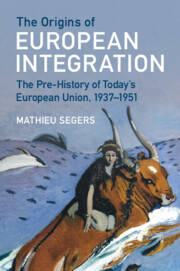‘A fascinating, ambitious, provocative, and wide-ranging story. Mathieu Segers takes the reader beyond diplomatic history to explain the deeper cultural, economic, and societal influences upon the early days of postwar European integration.’
Anne Deighton - University of Oxford
‘The originality of this book lies in its reconstruction of the inner world of ideas and emotions of the key actors and thinkers, as well as in its invaluable insights into the psychological dimension of power and its portrait of the battle of the ‘blueprints of hope.’
Kenneth Dyson - Cardiff University
‘Mathieu Segers convincingly shows that integration was about the complex art of achieving what is possible in highly unpredictable circumstances. This insight remains relevant to this day, making this book a must read for everyone interested in the European project and its future.’
Catherine E. de Vries - Bocconi University
‘Mathieu Segers exhibits how the ‘European Republic of Planning’ was conceived and put into practice in the aftermath of WW2. This book is highly recommended for those who want to see and ponder contemporary Europe and the trans-Atlantic ‘kinship’ through the historical lens.’
Jan Zielonka - University of Oxford and Venice, Ca Foscari
‘With remarkable rigour and breadth of scholarship, Segers demonstrates how the Western European Communities that emerged in the 1950s were shaped by the competition of earlier plans written shortly before and during World War II.’
Stella Ghervas - University of California, Los Angeles
‘… an important and fascinating research topic … multilayered conceptual and historical analysis … Recommended.’
A. E. Wohlers
Source: CHOICE
‘Seger's book makes an important contribution to the prehistory of the European integration process in several areas. … Both as a synthesis of earlier research and because of its novel approaches and hitherto unpublished material, the book will be indispensable for those who want to understand how different ideas and schools of thought influenced the planning for the postwar international order and for the reconstruction of Europe. It is a must-read for scholars studying how the interaction of intellectuals, academics, planners, and policymakers contributed to the emergence of the European Union that we know today.’
Robin M. Allers
Source: H-Diplo



